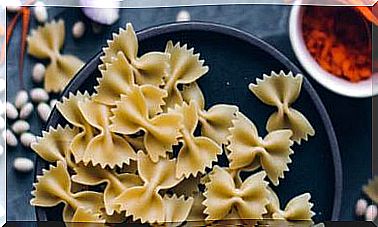Alkaline Diet: Why Does It Work?
The current diet and stress acidify the body, which favors problems such as osteoporosis. Alkaline foods like fruits and vegetables are essential in a healthy diet.

Human beings, like any other living organism, need to maintain an internal chemical balance to survive and for everything to function properly. One of the main regulatory mechanisms that the body has to maintain this internal balance is the control of the acidity or alkalinity of body fluids, especially blood.
This is known as the acid-base balance and is determined by the pH, which must be kept within a range so that the cells can function optimally.
What is an alkaline diet
As a result of the discovery of the acid-base balance in the body and the different self-regulating systems that help maintain this balance, it was observed that there are diets that tend to alkalize or acidify the pH of the urine, with different consequences for health.
This is important, because the current diet and stress tend to increase the acid load in the body, which has been associated with different alterations at the organic level, such as inflammation, weakening of the immune system and destruction of bone mass.
One of the findings that were made in this regard is that a balanced vegan diet with a good percentage of raw foods tends to alkalize the urine and that this helps to keep the blood pH in balance, which is very healthy, as well as that diet.
The Dr. Heinrich Lahmann and chemical Ragnar Berg tested in early twentieth century who feeds meat and fish ingested significant amounts of organic acids that alter the mineral composition of blood, showing a more acidic composition, while a vegetarian it always has a more alkalized blood.
Some media have denied the effectiveness of these diets, perhaps because they are practically vegetarian or vegan, compared to the Western diet, or also due to the fact that sellers of devices have appeared that claim to alkalize the blood pH, or that people who speak of Alkaline diets have been implicated in health fraud (such as the case of Robert Young, accused of illegal practice of medicine, or the biomagnetic pair therapy, now in vogue, which claims to regulate the pH of any organ instantly using magnets).
The important thing is to recognize that these diets are healthy, among other reasons for having this tendency to alkalize the urine or the media that act as regulators of blood pH.
The pH of the human body
PH is the measure of the acidity or alkalinity of a liquid and means “hydrogen potential”, that is, the concentration of hydrogen ions in that fluid.
It is measured on a scale of 0 to 14 :
- Neutral pH: corresponds to 7.
- Acidic pH: An excess of hydrogen ions gives pH values lower than 7, which indicate acidity.
- Alkaline pH: Few hydrogen ions translate into values higher than 7, which are a sign of alkalinity.
To ensure its survival, life on Earth maintains a balanced pH around living organisms and cells both in the sea and in the soil. Different degrees of acidity can in turn vary the behavior and composition of bacteria and plants. .
A hydrangea, for example, develops pink or blue flowers depending on the pH of the soil: in an acid soil (with a pH lower than 7) the flowers turn out blue, while in an alkaline or basic soil (with a pH higher than 7) pink flowers appear.
In the human body the pH can vary from one area to another.
- In the stomach there is extreme acidity, specifically a pH of 1.35 to 3.5, to promote digestion. This serves to some to justify that, whatever we eat, everything in the stomach will be acidic. However, the very walls of the stomach, to protect themselves, have a high pH, up to 8.
- In the skin we have a pH of 4 to 6.5, which provides an acid mantle that acts as protection against fungi and bacteria.
- In the vagina, a pH of 4.7 keeps the flora in balance.
- As for urine, it can have a pH that varies from acid to alkaline depending on the need to balance the internal environment. Hence, the pH of the urine is measured as an indicator of the degree of acidity or alkalinity that the body may be supporting at the blood level.
Blood pH is a constant that is rarely altered. If it does, it leads to coma, either due to alkalosis or acidosis. A normal pH in the blood is considered to be between 7.35 and 7.45, that is, a very slightly alkaline pH. To keep it within those limits that make life possible, the body has self-regulating mechanisms that act quickly to correct any deviations.
Renal excretion of excess alkali or acid, certain changes in respiration, and the use of connective tissue and bone as additional buffer systems allow the body to maintain fairly stable hydrogen ion levels.
Why is the alkaline diet interesting?
Foods can be classified into those that increase alkalinity in urine and those that increase acidity. Among the alkalizing foods we find fruits, vegetables, fruit juices, potatoes and drinks rich in alkalis, such as bicarbonated mineral water. Among the acidifying foods are grains, meats, dairy products, fish, beverages such as beer and cocoa).
The current Western diet, with abundant refined proteins, fats and sugars, as well as the so-called junk food has an acidifying tendency.
In addition, industrialization and intensive and chemical agriculture are altering the soil and marine pH. This can bring alterations in the food towards a lower alkalinity.
Greater descaling
Although diets rich in protein and refined products do not cause significant alterations in blood pH with their higher acid load, it is also true that they test the body’s compensation mechanisms –respiratory, kidney and bone–, which causes a decalcification and elimination of stones in the urine.
Studies have been done in people who have taken two urine samples in the morning for 5 years to check their pH and it has been seen that, although the urine was acidic, there were no more bone fractures. With this, we have wanted to conclude that the pH of the urine does not influence decalcification.
However, these studies did not measure the type of diet that the participants followed during this time, and the pH can vary from morning to afternoon depending on the diet. Heartburn in the morning can be a consequence of an overnight fast.
The calcium in the bones is a great reservoir of bases in our body to balance the acidic pH. In circumstances of malabsorption of calcium, lack of vitamin D or parathormones, or in case of excessive rest, calcium reserves are mobilized and osteoporosis occurs.
A meta-analysis has been published according to which an acidic diet and very rich in protein does not cause osteoporosis, but there are also scientific studies that show the opposite, so the controversy at the scientific level is well served for all tastes and beliefs.
Calcium and high protein diets
The typical Western adult diet contains between 70 and 100 grams of protein per day, which is nearly double the recommended daily requirement of 0.8 grams per day per kilo of body weight. Bone is a great ion exchange buffer system.
99% of calcium is concentrated in the bone, whose response to an acid overload consists of a physical-chemical reaction that promotes the release of carbonate, citrate and sodium. Chronic acid overloads, such as those imposed by hyperprotein diets, promote this cellular response of the bone with the consequent mobilization of calcium. In this way, the bone loses calcium and bone mass decreases in defense of blood pH homeostasis, since it is more important to survive to preserve the acid-base balance than all bone mass.
The long-term consequences of a small variation in the calcium balance are remarkable: an increase in the loss of calcium through the urine of 50 mg per day implies a loss of 18 grams per year or 365 grams in 20 years. Since the calcium content of the female skeleton averages 750 grams at its peak, this loss represents half of its total calcium reserve.
For the male skeleton, whose peak content is 1,000 grams, it represents a third of its total reserve. Thus, excess protein in the high acid load diet can decrease bone density if it is not buffered with alkalizing fresh foods. At the same time, it is necessary to know that the body needs the right amounts of protein: an excess can lead to osteoporosis, but a lack of it leads to loss of muscle mass.
High protein diets can also have metabolic consequences in various systems and organs, alterations in renal and endocrine functions, alterations in growth in children, and an increased risk of urolithiasis and obesity in later life.
Another acidifying factor: excess salt
Another feature of the modern diet is the excessive consumption of salt. Increased sodium in the body increases acidosis with bone and muscle loss.
The greater consumption of fruits and vegetables, with their abundance in potassium, contributes on the one hand to regulate the pH and, in addition, reduces the loss of calcium through the urine due to excessive consumption of salt.
Eating more foods that increase alkalinity in the urine also improves growth hormone secretion, which can reduce cardiovascular risk and also improve memory and cognition.
PH and cancer
In cancer treatments the efficacy of chemotherapeutic agents is influenced by pH. Many agents, such as epirubicin and adriamycin, require an alkaline medium to be most effective. Others, such as cisplatin, mitomycin C, and thiotepa, are more cytotoxic in an acidic environment.
The diets with alkaline trend would be advisable in some treatments; in others it would be fasting acidifying the environment. On the other hand, an alkaline environment is a common factor in some carcinomas of the oropharynx and esophagus, stomach, bronchi, cervix, and large intestine, usually with an acidic environment.
There is the hypothesis that a change to an alkaline pH in these cases increases the mitotic activity of the mucosal cells and that this change can often be avoided by modifying the diet and alkalizing medication or cleaning habits that alter these acidic pHs. The important thing is, therefore, to normalize the pH of each body environment and restore its balance.
The benefits of an alkaline diet
An increase in the consumption of fruits and vegetables on an alkaline diet could improve the ratio between sodium and potassium and benefit bone health, reduce the loss of muscle mass and thus contribute to the prevention of chronic diseases such as hypertension and strokes.
Another benefit of eating an alkaline diet is that there is an increase in intracellular magnesium, which is required for the function of many enzyme systems. It also increases the available magnesium, necessary to activate vitamin D, which adds to the alkaline diet the numerous benefits of vitamin D to regulate calcium, improve the production and secretion of hormones and mechanisms that act both inside and outside the cells. cells.
A vast majority of recurrent urinary infections are caused by Escherichia coli bacteria , which live well in acidic pH environments. By alkalizing the urine, this bacterium has a worse survival. Medicinal plants that protect against infection by this bacterium by preventing it from adhering to the wall of the bladder – such as bearberry and red currant – also work better if the urine pH is alkaline. The alkaline diet is therefore indicated both to improve infections and to prevent them.
How to start an alkaline diet
In general, a healthy, complete and balanced diet, rich in fresh seasonal fruits and vegetables, tends to alkalize urine. Therefore, a diet that alkalizes the urine would be, in principle, recommended for everyone and especially advisable for those people who systematically present an acidic pH in the urine.
There are exceptional cases that can be treated precisely with less alkalizing diets, such as when fasting is punctually performed or a ketogenic diet is followed for therapeutic purposes. From there, it is a question of seeing, then, if our usual diet is healthy in all aspects, in addition to having the right amount of proteins and essential foods in the right proportion, it gives an alkaline tendency.
For this, priority should be given to alkalizing or only moderately acidifying foods. Studies have been carried out to classify foods according to their ability to potentially acidify urine (PRALs), although analyzing them by group some general ideas can be established:
- Fruits and vegetables: they are good alkalizers and ideal for balancing a diet. Lemon and other citrus fruits, despite being acidic with a very low pH, behave as alkalizing agents once digested.
- Meat and fish: they are considered acidifying due to their richness in protein, the excessive consumption of which has been associated with greater acidification in the urine and an overload of the mechanisms that act to try to regulate blood pH
- Legumes, nuts and seeds: these are considered acidifying, although the green pods of beans and peas are not.
To tend to an alkalizing diet throughout the day it is important that there is a strong presence of fresh and seasonal fruits and vegetables. These should be eaten ripe, as they are more alkalizing.
In addition, it must be taken into account that cooking food reduces its alkalizing power, so it is advisable to consume raw fruits and vegetables on a daily basis.
Since an alkaline diet includes more fruits and vegetables, it is also important to be aware of the type of land where they grew, that is, if they come from organic crops or intensive crops with phytosanitary products that alter the pH of the soil. Taking care of agriculture is linked to health care, since the type of soil and its pH can influence the mineral content and the balance of the plant itself.









